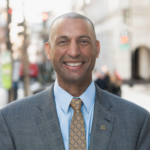November 29, 2022
Book Review: Winning the War to Secure Multiracial Democracy
President of the Joint Center for Political and Economic Studies

For decades, author and activist Steve Phillips has navigated the loosely aligned but distinct worlds of Democratic donors, progressive think tanks, community organizing, and multiracial coalition building. He has pushed Democratic party leaders to hire diverse staffers and vendors, and he has founded groups that support progressive organizing and diverse candidates. He’s also urged Democrats to win more elections by shifting resources from targeting a narrow group of white swing voters to expanding participation by voters of color.
In his new book How We Win the Civil War: Securing a Multiracial Democracy and Ending White Supremacy for Good, Phillips asserts that our nation faces a primary question of whether we are “fundamentally a white nation or a multiracial democracy.” He believes that too many progressives avoid this question (and racial issues generally) because they discount the question’s importance or because they fear political backlash from white moderates and conservatives. Phillips argues that the Civil War never truly ended and continues to this day—and that Americans need to wake up and stop contemporary efforts to destroy multiracial democracy.
In the first part of the book, Phillips asserts that in each era since 1865, Confederates and their ideological descendants have consistently used five tactics to stifle multiracial democracy: 1) never give an inch; 2) ruthlessly rewrite the laws to preserve white power; 3) distort public opinion to whitewash white supremacy; 4) silently sanction terrorism; and 5) play the long game.
For example, Phillips argues that opponents of multiracial democracy were unyielding in the 1950s when they closed rather than integrated public schools, and are unyielding today in refusing to accept that Joe Biden won the 2020 election. Multiracial democracy opponents once preserved power by erecting poll taxes and literacy tests—they now ban 24-hour voting and giving food and water to voters waiting in line. Confederate monuments and films like Birth of a Nation were once the primary tools to whitewash public opinion, and now that work is done by racialized disinformation on social media and cable news. Past government officials passively sanctioned KKK terrorism and mob lynchings, while contemporary officials obstruct investigations of white domestic terrorist networks and January 6 insurrectionists.
In the second part of the book, Phillips provides a roadmap for multiracial democracy supporters to win the Civil War. He highlights local organizations and leaders like Stacey Abrams, Tram Nguyen, and Andrea Guerrero who have successfully turned red areas blue in places like Georgia, Arizona, Virginia, San Diego, and Houston. He urges progressives to replicate these victories using four key strategies: 1) invest in visionary local leaders who are committed to the larger cause; 2) build strong civic engagement organizations; 3) develop detailed, data-driven plans to identify and mobilize underrepresented voters of color; and 4) “play the long game” to set and achieve incremental goals over several election cycles that eventually transform the electorate and public policy.
---
How We Win is an unapologetically progressive organizing book. Phillips offers inspiring stories of everyday people utilizing democracy to organize and transform their communities. He shows how change happens by quoting directly from organizing strategy memos and showing data on the number of new voter registrations and door knocks needed to increase turnout and win elections. Phillips shows that multiracial democracy is not the inevitable byproduct of demographic change, but also requires strong local leaders and institutions, data, and strategy. How We Win is required reading for every volunteer and professional progressive organizer who wants to take action rather than just complain or pontificate.
Some “Make America Great Again” adherents may claim that Phillips is fueling division by declaring Civil War on all 74 million Americans who cast ballots for Donald Trump in 2020. But Phillips’s stated target is white supremacy—and rather than trying to contain this threat through appeasement he sounds the alarm to rally action against it. Phillips explicitly acknowledges the value of compromise in communities “bound together by common values and mutual respect,” but believes that in light of historical and contemporary attempts to cripple multiracial democracy, “it is nonsensical to continue to act like our opponents are people of good faith.” For Phillips, “[w]inning a war requires that you first recognize that you are in a war.”
While Phillips’s book is an important contribution because of its potential to inspire organizers and convince Democrats to fully embrace multiracial democracy, I do want to add a dose of reality.
If the Civil War was not won in 1865 or upon the passage of the Voting Rights Act of 1965, it will not be won after local organizers mobilize voters of color to transform politics in places like Florida, Georgia, North Carolina, and Texas. Granted, widespread civic engagement is essential, and policies will better reflect the interests of communities of color. But multiracial democracy will not be secure.
Top congressional staff—both Republican and Democratic—likely still will be disproportionately white. White supremacists and election deniers will still use tech platforms to distort public opinion with racialized disinformation, and invoke the need to protect their "freedoms" to incite and justify violence. While some politicians will be more responsive to voters of color, others will try to contain these voices by erecting new voting barriers. A majority of the current U.S. Supreme Court will still undermine the future of multiracial democracy by diluting the Voting Rights Act and the 14th and 15th Amendments.
Republican and Democratic politicians will still try to appeal to whites who harbor little racial animus, but feel increased cultural anxiety because the white share of the overall electorate is declining. The bulk of this group will still likely support policies they feel preserve their own status like Social Security and immigration restrictions, while opposing Medicaid, racial equity proposals, and reforms that expand the freedom to vote.
The future of multiracial democracy is bigger than any one book, election cycle, or political party. To truly secure a multiracial democracy, we will need citizens, grassroots leaders, researchers, historians, technologists, policymakers, philanthropists, strategic planners, and public education and debate to work through some big issues. The work will take time and the inclusion of diverse communities—it cannot simply be driven by a few white experts with sign off by a handful of civil rights groups.
In proactively building a new multiracial democracy, we’ll need to grapple with tough questions. How do we truly transform rather than simply retrofit institutions that were never originally designed to facilitate multiracial democracy, like the U.S. Senate and House, the Electoral College, the U.S. Supreme Court, state governments, and tech platforms? Can we truly have a healthy multiracial democracy if the concept is seen as the dominion of one major political party while being opposed by the other? When are election rules that favor a declining white population a legitimate exercise of democracy, and when are they racial entrenchment? What lessons about multiracial democracy can we learn from other countries?
How We Win is a foundational contribution to the emerging field of multiracial democracy. By centering community organizers rather than abstract manifestos, the book demonstrates an authentic commitment to democracy. How We Win is well positioned to shape election outcomes, policy outcomes, and debates about the future of multiracial democracy.
_______

Spencer Overton is a Professor of Law at George Washington University who specializes in race, democracy, and law. He is also the fifth president of the Joint Center for Political and Economic Studies, which was founded in 1970 and is America’s Black think tank.
Civil rights, Racial Justice, Truth, Racial Healing, & Transformation




